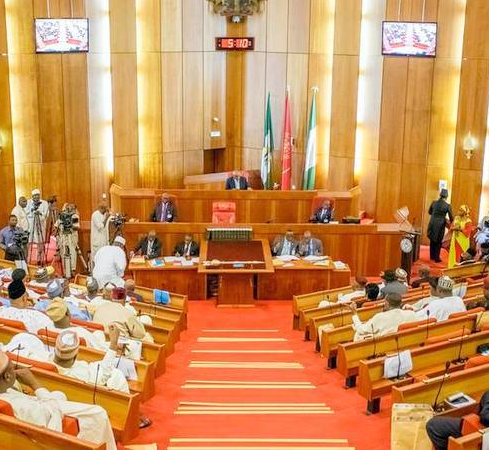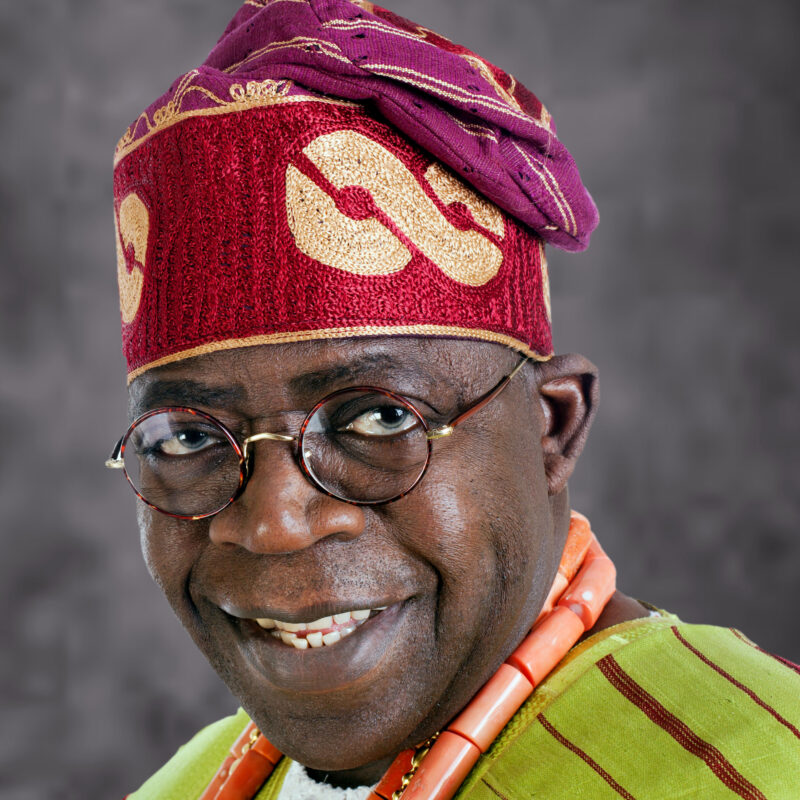Asiwaju Bola Ahmed Tinubu is an exemplar, icon of democracy, great defender of the masses, and consummate businessman. The epithets celebrate the giant strides of the third civilian governor of Lagos State, in rescuing Africa's foremost city-state from imminent failure to eminent fortune.
But they didn't come cheap. Degrees from academic accomplishments in Richard Daley College and Chicago State University in Illinois, managerial expertise from working with global blue chip companies and deep native intelligence and talent in spotting opportunities in problems combined to build a man who lives and has survived by creating value.
Born on 29 March 1952, Tinubu left for the United States in 1975 in pursuit of the Golden Fleece.
To survive in the United States, he worked as a cab driver in Washington DC before he eventually headed for Chicago where he also engaged in menial jobs like door guard, hotel steward and security man.
It became very clear to him, that, unlike Nigeria where he knew his way around the system, he could not survive for long on menial jobs. He had to pass through the formal educational system.
Luckily for him, the government had put in place programs to encourage Black Americans, who were deemed unwilling to read, to improve themselves.
One of such adult education schools was Richard J.Daley College, Illinois. It was set up to prepare students for university education. A student could transfer credit from the community college to the state-owned university. Tinubu enrolled there and used his earnings to support himself.
Though he combined the menial jobs with his education at Richard Daley College, this did not affect his academic performance as he graduated in flying colours, scoring As in his courses..
He thus gained admission into Chicago State University. He was particularly good in Mathematics and Accounting. His academic prowess also quickly became apparent at the University as he was one of the candidates on the Dean’s list in his first term at the institution. Indeed, one of his favourite lecturers at the institution, Joe Jesse, commended his hard work, class participation and brilliance while urging him to keep up the excellent track record.
He took the advice to heart and at the end of his first year, his brilliance earned him the position of a tutor in the institution. That meant, his course mates who had difficulty mastering their courses could approach him to teach them.
Thus, the University was paying his tuition as he helped in teaching some of his mates. He eventually graduated on top of his class as an Accounting major. It was not a surprise that five out of the eight big accounting firms in the United States, including Arthur Andersen, Deloitte and Touche, etc., offered to employ him right on the campus.
Based on the advice of his tutor, Tinubu settled for Deloitte and Touche where he resumed work in June 1979. As a staff of Deloitte and Touche, Tinubu was involved in setting up the accounting and auditing system of National Oil which became the Joint Venture Partner of Aramco Oil in Saudi Arabia among other giant corporations in and outside of the United States.
His homecoming began when he joined Mobil Nigeria where he rose to become the general auditor within two years as a result of his sterling performance on the job. A 28-page report he authored on the financial situation earned him a promotion to the post of treasurer. Among others, Tinubu was credited with managing the finances of the corporation to ensure the successful completion of the present Mobil House in the Lekki area of Lagos.
it was Bola Tinubu's generosity while at Mobil that lured him into politics. His reputation as a humanist soon got to the contractors. One of them, Dapo Sarumi encouraged him to support his political group.
Sarumi'a political group, PRIMROSE had broken away from ASE, the mainstream tendency and was mobilising to take over dominance of Lagos politics.
The opportunity to achieve this was provided by the transition programme of the military government of General Ibrahim Babangida to return Nigeria to democratic rule in the early 90s.
Tinubu started by raising funds for Sarumi who indicated an interest in the Lagos governorship seat. When Sarumi was banned, Tinubu threw his weight behind Yomi Edu who lost the governorship election. However, Tinubu’s deep foray into politics began when members of his political association, the Primrose Group persuaded him to run for the Senate where he will be able to put his intelligence, brilliance and dynamism at the service of Nigeria.
The management of Mobil was shocked when he told them he wanted to quit his great career in the Corporation for politics and tried to dissuade him. He insisted and was granted a four-year leave of absence to fulfil his ambition. He left, contested for the Lagos West Senatorial district under the Social Democratic Party, SDP and won. He polled the highest votes among senatorial candidates in the country.
In the Senate, he was the chairman of the Appropriation, Finance, Banking committee. He also chaired two other committees. He had the support of some of his colleagues to become the senate President. But he dropped the ambition to support late MKO Abiola, who was running for the presidency.
Tinubu deployed his experience in corporate and strategic planning to ensure the emergence of MKO Abiola as the presidential candidate of SDP and winner of the June 12 presidential election.
The then military President Ibrahim Babangida later annulled the election and this opened a new phase in the political life of Tinubu who was joined multidimensional efforts to reclaim Abiola’s mandate. Eventually, Babangida was forced to vacate office as a result of pressure from Nigerians. The military president however put in place a contraption called Interim National Government, ING, headed by late Chief Ernest Shonekan.
Tinubu and 29 of his colleagues in the Senate popularly known as the G-30 continued their agitations for reversal of annulment of the June presidential election and full democracy in the country. The group continued to hold meetings until the overthrow of the ING by General Sani Abacha. The G-30 members that Tinubu put together met at the Tafawa Balewa Square in Lagos and declared the Abacha government illegal before local and international media.
This led to the arrest of some Senators such as Abu Ibrahim, the late Polycarp Nwite, Ameh Ebute and others. Tinubu went underground but was declared wanted by the military. He was eventually arrested and detained with others. When he was released, Tinubu took part in the formation of NADECO alongside other pro-democracy activists.
The new political platform was used to continue the fight for the restoration of the mandate of June 12 presidential election and Nigeria’s return to democracy.
However, with constant harassment, arrest and detention by operatives of the Abacha government, Tinubu, like other pro-democracy activists, was forced into exile where he continued the fight for the actualisation of June 12 and restoration of democracy to the country.
While in exile, he continued to provide the resources to keep the agitations going at home and abroad.
However, following the death of General Abacha and MKO Abiola, Tinubu, returned to Nigeria in 1998 to join in the transition programme of General Abdusalami Abubakar.
He was elected as the governor of Lagos State in 1999 on the platform of the defunct Alliance for Democracy (AD). It was a testimony to his astuteness as a politician that he survived President Olusegun Obasanjo’s engineered Tsunami that swept other AD governors in the Southwest out of office in 2003.
He won re-election and completed his two terms of four years each that ended in 2007. In his eight years in office, Tinubu was credited with laying the foundation for the ongoing transformation in infrastructural development in Lagos. He also deployed his financial knowledge to boost the state’s internally generated revenue so much that Lagos was able to survive the seizure of its allocation from the Federal Government after the creation of additional 37 Local Council Development Areas for Lagos. The Obasanjo government had held on to the funds despite a Supreme Court judgment that ruled the action illegal.
He also revamped the state’s judicial system with improvement in the welfare of judicial officers, reforms of the civil and criminal procedure rule and innovations such as the creation of the Citizens Mediation Centre and Office of the Public Defender.
In the health sector, Tinubu was credited with the establishment of five new general hospitals in Lagos, upgrade of facilities at the Lagos State Teaching Hospital and introduction of free ante-natal care for women, free eye treatments and free glasses, popularly called 'JIGI BOLA'.
He also laid the foundation for the Bus Rapid Transit System and LAGBUS transport service. In addition, Tinubu established the Lagos State Traffic Management Authority (LASTMA).
He was involved in the fight for true fiscal federalism with more than 10 cases instituted at the Supreme Court on the determination of the statutory responsibilities of the states and federal government.
He has remained relevant politically since he left the office of Lagos State Governor in 2007. For one, he has taken a keen interest in his successors to ensure that Lagos continues to grow and remain a shining light to other states as it remains the epicentre of commercial activities in the country.
He has also played active roles in politics and all elections held in the country. In 2007, his Action Congress fielded former Vice President Atiku Abubakar as its candidate in the presidential election.
AC candidates also contested elections in Edo, Osun, Ekiti. Though the candidates were initially rigged out in the elections, Tinubu sponsored multifaceted legal battles to reclaim the states, involving innovative forensic analysis of the ballots cast.
Also, in 2011, the AC which transformed into Action Congress of Nigeria fielded former anti-corruption czar, Malam Nuhu Ribadu as its presidential candidate, while also winning elections at the state level as well as national and state legislative seats.
Ahead of the 2015 election, Tinubu was at the vanguard of the merger which gave birth to the All Progressives Congress, the first successful political merger in the country. He contributed to the success of the party at the 2015 polls and the election of President Muhammadu Buhari. The party thus ended the 16 year dominance of Nigeria’s politics by the PDP.
Now, Tinubu has offered himself for the presidency. Some say it is payback time

He was elected to the Senate, representing the Lagos West constituency in the short-lived Nigerian Third Republic

After the results of the 12 June 1993 presidential elections were annulled, Tinubu became a founding member of the pro-democracy National Democratic Coalition

In January 1999, he stood for the position of Governor of Lagos State on the AD ticket and was elected governor.

Tinubu, alongside a new deputy governor, Femi Pedro, won re-election into office as governor in April 2003